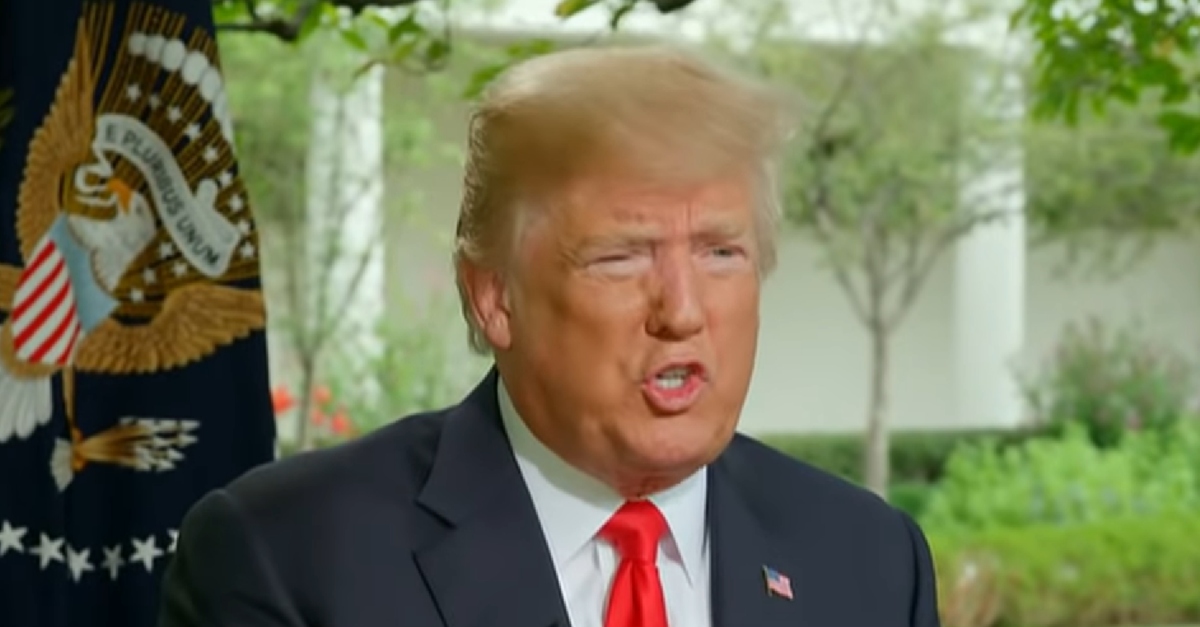
President Donald Trump dropped a bombshell in an interview with Axios, saying that he plans to sign an executive order eliminating birthright citizenship. It has long been held that if you are born in the United States, you are an American citizen. Trump’s move would be a hard line approach to illegal immigration, eliminating the possibility of people entering the United States illegally and then having children who are automatically citizens.
This, of course, raises the question: Can a president even do this? At first glance, the answers seems to be an easy “no,” but there is an argument that Trump could make. As Axios noted, former Trump administration national security official Michael Anton said the president could to this via an executive order, but Anton recognized that this would face a legal challenge.
Whether it would survive such a challenge remains to be seen, and the issue will all but certainly end up before the Supreme Court.
The notion of birthright citizenship comes from the Fourteenth Amendment, which states:
All persons born or naturalized in the United States and subject to the jurisdiction thereof, are citizens of the United States and of the State wherein they reside.
This seems to clearly state that anyone born in the U.S. is a citizen, but the key phrase is “subject to the jurisdiction thereof.” The fact that it says this means that simply being born or naturalized in the U.S. is not enough. So what does it mean? More importantly, what would the Supreme Court say it means?
President Trump’s Supreme Court picks were reportedly endorsed by the conservative Federalist Society. His pick for the Fifth Circuit Court of Appeals, James C. Ho, also has ties to that group. Judge Ho, before he was a judge, wrote about the meaning of the 14th Amendment in a piece for the Wall Street Journal in 2011.
“The plain meaning of this language is clear,” Ho wrote. “A foreign national living in the United States is ‘subject to the jurisdiction thereof’ because he is legally required to obey U.S. law.” By contrast, he said, foreign diplomats have immunity because they are not subject to the jurisdiction of the United States.
Ho went on to list cases that upheld birthright citizenship for children born to non-citizens, such as 1898’s United States v. Wong Kim Ark, 1982’s Plyler v. Doe, and 1985’s INS v. Rios-Pineda. Ho said that relitigating this issue would be “reopening the scars of the Civil War, and offending our Constitution and the rule of law.” Granted, he was referring to the idea of states trying to enforce their own citizenship laws, not the president taking executive action. Still, his constitutional interpretation remains the same, and a line from his first judicial opinion earlier this year echoes this: “The unfortunate trend in modern constitutional law is not only to create rights that appear nowhere in the Constitution, but also to disfavor rights expressly enumerated by our Founders.”
If a case challenging a Trump order made it before Judge Ho, it doesn’t seem like it would go in Trump’s favor.
With all that being said, how can we tell how Supreme Court Justices would rule on this issue?
Trump’s first SCOTUS pick, Justice Neil Gorsuch, summed it up pretty well during his confirmation hearing, and he was discussing the Fourteenth Amendment at the time. While Gorsuch was focusing more on the Equal Protection clause than anything else, one thing he said is relevant.
“A good judge starts with precedent and doesn’t reinvent the wheel,” Gorsuch said. “So to the extent there are decisions on these topics – and there are – a good judge respects precedent.”
Likewise, Justice Brett Kavanaugh has spoken to the significance of precedent and calling “balls and strikes,” allowing the Constitution to dictate rulings instead of the other way around.
Several cases going back to 1898 is pretty significant precedent. Conservative justices also appreciate plain interpretation of the Constitution, without taking an activist approach known to be used by liberal jurists. As Ho said, the plain meaning hear is clear: unless you’re a diplomat, if you have a child here, they are a citizen.
The four left-leaning justices would likely shoot down an executive order like this in an instant. It would just take one conservative to follow precedent and plain meaning to kick this issue to the curb.
Even opponents of birthright citizenship may be nervous by Trump’s attempt to unilaterally change how citizenship works.
Rep. Steve King, (R-Iowa), is strongly in favor of eliminating birthright citizenship. His own website lists reasons for getting rid of it, and his own constitutional interpretation.
“The history of the drafting of the 14th Amendment makes clear that the language ‘subject to the jurisdiction thereof’ meant a citizen could not owe allegiance to any other foreign power,” King says. The clear argument to this is that if a person is trying to escape their former country, they probably don’t bear any allegiance to that country.
Still, even King doesn’t suggest that the president try to go it alone in challenging current understanding of the Fourteenth Amendment.
“Because the Supreme Court has not interpreted the Constitution to mandate automatic birthright citizenship, the Congress can pass a law to correct the current misguided and incorrect policy of automatically granting citizenship to children of illegal immigrants,” he suggested. He’s saying Congress can pass legislation, which is very different from the president taking unilateral action. And, of course, such legislation would still be challenged and end up before the Supreme Court.
So can Trump really do this? Probably not, but it sure looks like we’re about to find out.
[Image via Fox News screengrab]
This is an opinion piece. The views expressed in this article are those of just the author.